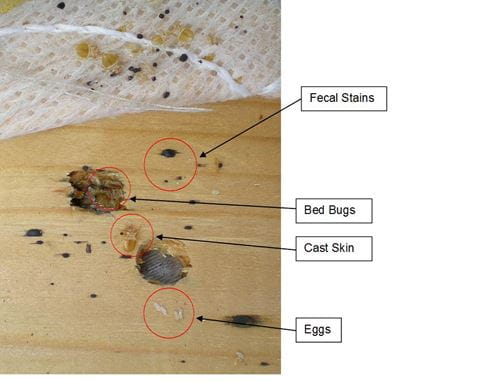The web Browser you are currently using is unsupported, and some features of this site may not work as intended. Please update to a modern browser such as Chrome, Firefox or Edge to experience all features Michigan.gov has to offer.
Bed Bugs
What are bed bugs?
Bed bugs are small, flat insects that feed on the blood of people and animals when they sleep. Bed bugs are experts at hiding. Their slim flat bodies allow them to fit into the smallest of spaces and stay there for long periods of time, even without a blood meal. Bed bugs are usually transported from place to place as people travel. Bed bugs are not a sign of a dirty home or poor personal hygiene. Bed bugs are not known to spread disease, but can be an annoyance because their presence may cause itching and loss of sleep. If you think you may have bed bugs, it's very important to do a thorough inspection, and to begin treatment as soon as possible. Treating a bed bug infestation early will save much time and expense. Please read below for important information on how to deal with bed bugs.
-
Who is at risk?
Any home is at risk of a bed bug infestation.
Bed bugs are not a sign of a dirty home or poor personal hygiene. Bed bugs are hitchhikers - they travel to new places by hiding in furniture, suitcases, or other objects that get moved around. Before bringing new items into your home, especially items such as used or antique furniture, mattresses, or bedding, you should inspect them for signs of bed bugs. Also be on the lookout for signs of bed bugs when you travel. In multi-unit housing, bed bugs can also spread from one infested home to other neighboring homes be crawling through walls, ceilings, and hallways.
-
Signs and Symptoms
Signs of a possible bed bug infestation
Many people will react to bed bug bites with an itchy welt, similar to a mosquito bite. However, bite reactions can vary from person to person, and some people do not react at all. Fortunately, bed bug bites have not been found to spread any diseases.
Other signs of a bed bug problem can include: finding small wingless bugs in cracks and crevices around the bed, seeing small blood spots or bed bug fecal matter on bedding, or finding bed bug eggs and/or cast skins. Not all bugs that you find in your bedroom are bed bugs - if you find a bug that you suspect is a bed bug, you should save it to show to an expert.

-
Diagnosis and Testing
How do I find out if I have bed bugs?
The only way to find out for sure that you have bed bugs is to find a live bed bug in your home. You can't tell just by looking at the bites. If you suspect that you may have bed bugs, you should do a careful inspection of your bed or sleeping area. You can also contact a pest management professional to do an inspection for bed bugs.
For detailed instructions on how to inspect for bed bugs, see our booklet "Getting the Bed Bugs Out".
-
Treatment
How do I get rid of a bed bug infestation?
Eliminating a bed bug infestation is a complicated and labor-intensive process. Your best bet is to act quickly and bring in an experienced pest management professional. There are several different treatment methods that professionals can use, separately or in combination, to eliminate bed bugs from a home.
Bed bug foggers (a.k.a. "bug bombs") are not effective at killing bed bugs. Many of the "all-natural" sprays available on the market are also ineffective at controlling bed bugs. We do not recommend using rubbing alcohol to treat a home for bed bugs - it's effectiveness is limited and it is highly flammable. For more information on treatment methods that can be safely used by nonprofessionals, see our booklet "Getting the Bed Bugs Out".
-
Prevention
Don't bring them home!
Avoid picking up used mattresses or secondhand upholstered furniture because it’s hard to see whether they harbor bed bugs. Other used furniture must be carefully inspected and cleaned before you bring it home. Scrub furniture with soapy water or a household cleaning product to remove any possible bed bugs or their eggs.
Second-hand clothing should be placed in a sealed, plastic bag and emptied directly into the washing machine. Wash in hot water and dry on high heat setting to kill bed bugs and their eggs.
When visiting hotels inspect the room for signs of bed bugs prior to unpacking luggage.
-
Educational MaterialsMDHHS Materials
- Don't Let the Bed Bugs Bite (English) (Spanish) (Arabic)
- Michigan Manual for the Prevention and Control of Bed Bugs
- Getting the Bed Bugs Out: A guide to controlling bed bugs in your home
- Bed Bugs: What Schools Need to Know
- Bed Bugs: What Camps Need to Know
- Bed Bugs & Mattresses fact sheet
- Choosing a Pest Control Company
- How to Move and Leave Bed Bugs Behind
- Bed Bugs Management Decision Flowchart
- Bed Bugs 101 for Home Visitors Webinar
- MDCH & MPMA Bed Bug Public Service Announcement #1 (radio spot)
- MDCH & MPMA Bed Bug Public Service Announcement #2 (radio spot)
- Communicable Disease Division Publication Order Form
Materials and Resources from other Agencies
- Michigan Pest Management Association
- Tackling Bed Bugs: A Starter Guide for Local Governments
- New York City Department of Health Bed bug site
- Bed Bug videos from Purdue University
- Guidelines for Prevention and Management of Bed Bugs in Shelters and Group Living Facilities
- NEHA & CDC Vector Control training course (includes bed bugs)
- Bed Bug Action Plan for Home Healthcare and Social Workers - Dini Miller and Stephen Kells